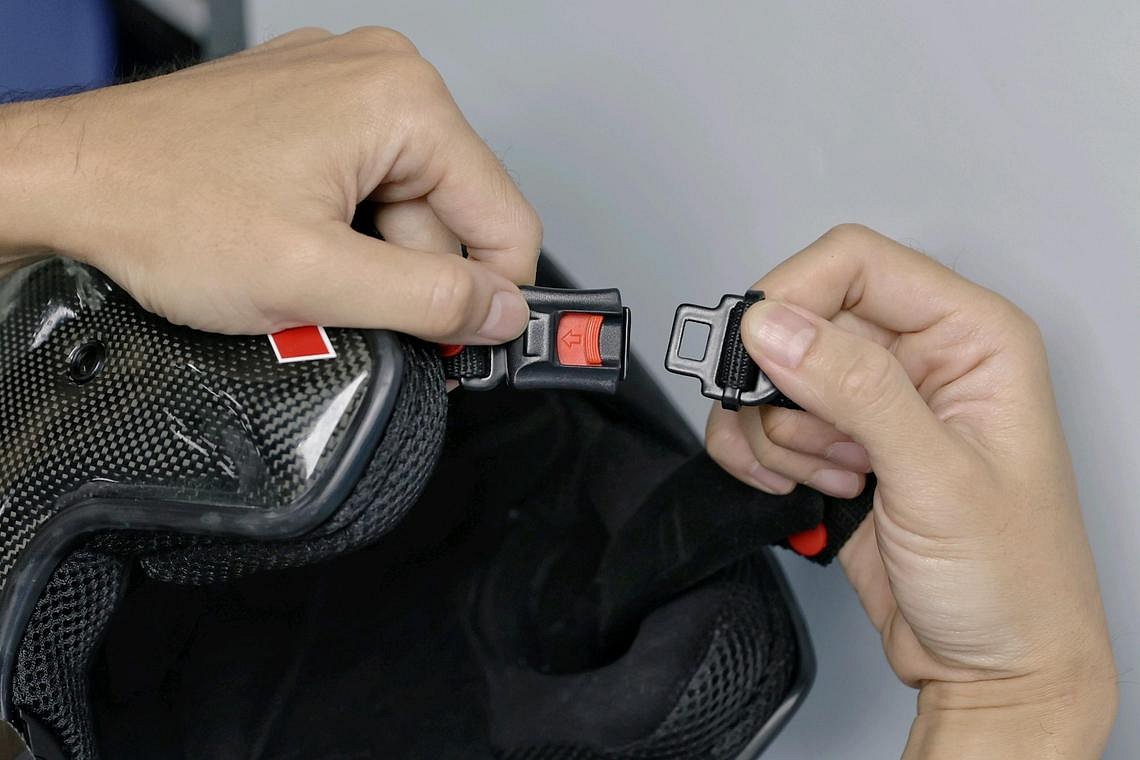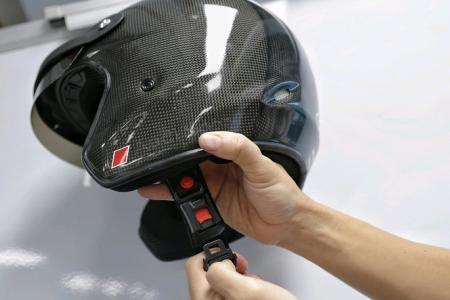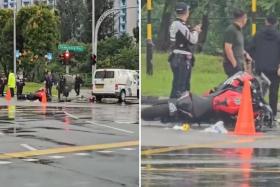New standards pave way for helmets with quick-release straps in S’pore
When content creator Winston Chuang rides his motorcycle across the border each week, he dreads having to fumble with the chin strap of his helmet when he removes it to clear immigration – first on the Singapore side, and once more before entering Malaysia.
Motorcyclists like Mr Chuang, 42, have reason to cheer after recently revised national standards for motorcycle helmets look set to pave the way for quick-release chin strap mechanisms to be approved for use here.
Announced on Oct 19 at the National Bikers Weekend, a mass motorcycle event at the Changi Exhibition Centre, the change means such helmets can be approved for use here if they pass tests done in Singapore.
Helmets have to be tested before they are approved for use on the roads here.
At present, the tests include determining the strength of chin straps and that of helmets against penetration, and how well a helmet’s visor allows light to pass through.
The revised standards were published by trade agency Enterprise Singapore’s standards division in November.
The respective regulators will make the final assessment of what goes into their regulations.
Enterprise Singapore and the Traffic Police did not disclose how or when the revised standards will be rolled out when asked by The Straits Times.
Quick-release mechanisms latch like the seat-belt buckle in cars, eliminating the inconvenience of threading a helmet’s chin strap through two D-shaped metal rings.
Mr Rex Tan, co-convener of a working group tasked with reviewing the standards for motorcycle helmets, said such mechanisms are quick and convenient, even when a motorcyclist is wearing riding gloves.
The updated specifications bring them in alignment with the latest regulations set by the United Nations Economic Commission for Europe (UNECE) in 2021. This means that helmets that comply with UNECE regulations – including those with quick-release chin straps – will pass the tests in Singapore.
The standards, which are unique to Singapore, were last revised in 2014.
Importers here said that because the 2014 requirements differed from recognised standards adopted in places such as Europe or the US, it was not a given that a helmet complying with these overseas standards will pass the tests in Singapore.
They also said that because Singapore is not a large market for helmets, manufacturers do not typically engineer helmets specific to the country’s requirements.

Owing to how the Singapore tests were designed under earlier standards, helmets with quick-release mechanisms tend to fail the tests. As such, importers said they did not try to bring in such helmets.
That is why the large majority of approved helmets here are D-ring ones.
Mr Aldrich Jai Kishen, a youth social worker who rides a Harley-Davidson motorcycle, welcomed the updated standards. The 30-year-old is looking forward to a greater variety of good-quality helmets being made available.
Mr Chuang, the content creator, believes that the convenience of quick-release mechanisms will also encourage riders – especially those who travel short distances – to wear their helmets securely before setting off.
“Think about the food delivery rider, whose rides can be so short, shuttling from one location to the next, and taking their helmets on and off so frequently,” he said.
“Instead of just wearing their helmet loosely, even not bothering to hook up the D-rings, they can just snap the quick release. It will be so easy.”
The industry-led Singapore Standards Council, with the support of Enterprise Singapore, started the working group in March 2023 to look into updating the specifications for motorcycle helmets. It comprises representatives from the public and private sectors, and the Traffic Police.
In response to ST’s queries on the reasons for the review, a spokesperson for Enterprise Singapore said all Singapore standards are reviewed periodically to “keep pace with changes and developments in the industry”.
“These reviews are conducted in conjunction with relevant stakeholders from the public and private sectors,” the spokesperson added.
The Traffic Police told ST that the review was to maintain the currency of the motorcycle helmet standard, and ensure motorcyclists continue to be accorded the best protection against accidents.
In addition, the latest review removes the need for a penetration test, where a spike is dropped onto the upper part of a helmet to see if it can be punctured. This is also not part of UNECE regulations.
The working group said helmets that pass the current penetration test tend to be heavier, and there has been no record over the past two decades of traffic accidents that resulted in penetrative head trauma.
The working group’s Mr Tan, who helms the Singapore Motor Cycle Trade Association, said the organisation is also working with the authorities to seek alternative certification procedures that do not involve destroying samples in every batch of helmets due for approval.
This batch-testing requirement adds to the cost of making helmets available to consumers, he said.
Importers said the batch tests now cost them around $2,200 for each batch of helmets they bring in, which can comprise up to 100 pieces. When approval is granted, it applies only to helmets of the same brand and model within the same shipment.
Mr Tan said the lower cost of making helmets available if this requirement is changed can then be passed on to customers in the form of lower retail prices.
This will, in turn, encourage consumers to buy their helmets from official sources in Singapore, rather than turn to online shops, which could be parallel importers that sell non-approved versions at lower prices. At present, parallel-imported helmets are not tested locally for approval.
Mr Tan said it is common for bikers to go to a physical shop to try out a helmet before going online to buy versions of the helmet that have not been approved.
“There is no guarantee that the helmets from these shops are genuine. This puts the safety of the users at risk,” he added.
The Traffic Police said 156 motorcyclists were caught wearing non-approved helmets between January and October.
The offence carries a maximum fine of $1,000 or a jail term of up to three months, or both. Repeat offenders can be fined up to $2,000 or jailed for up to six months, or both.
Get The New Paper on your phone with the free TNP app. Download from the Apple App Store or Google Play Store now


